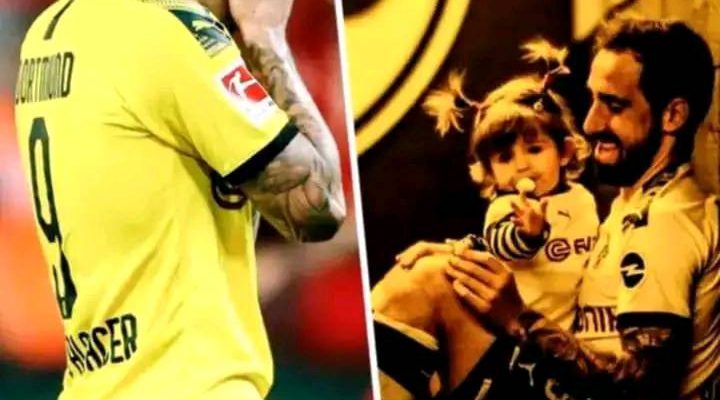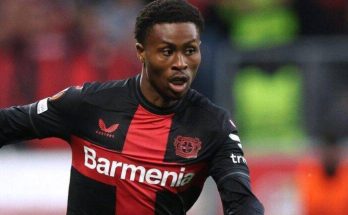Paco Alcácer’s story is one of both brilliance and brutal unpredictability in the world of football. At just 32 years old, he finds himself without a club, a shocking development for a striker who once commanded fear across top European leagues. This is a player who, not long ago, electrified Bundesliga stadiums with his clinical finishing, remarkable movement, and ability to change games within moments. That someone of his proven pedigree can now be without a team raises not just eyebrows, but deeper questions about the state of modern football, the unforgiving nature of form and fitness, and the volatile value systems that dictate a player’s worth in today’s game.
Alcácer’s rise to prominence was not without its challenges. Emerging from Valencia’s youth system, he was quickly labeled a talent to watch. Though he struggled initially to consistently break into the first team, his goal-scoring instincts were evident from a young age. His performances caught the eye of clubs across Spain, and it wasn’t long before Barcelona came calling. At the Catalan giants, however, Alcácer found it difficult to cement a starting role amid fierce competition from superstars like Luis Suárez, Lionel Messi, and Neymar. Still, he made the most of his opportunities, contributing important goals and learning from some of the very best. It was during this time that he built a reputation not just as a striker, but as a professional – one who worked hard, kept his head down, and waited patiently for his chances.
But it was his move to Borussia Dortmund that truly reignited his career. In the black and yellow of BVB, Alcácer became a sensation. He arrived on loan initially, but wasted no time making an impression. Game after game, he came off the bench to score dramatic goals. His impact was so immediate and so profound that he was soon signed permanently. In the 2018-2019 Bundesliga season, he scored 18 goals in just 1,200 minutes of league play – a staggering rate of one goal every 66 minutes. Fans adored him. He wasn’t just scoring; he was rescuing games, snatching points from the jaws of defeat, and reviving Dortmund’s title hopes in a league dominated by Bayern Munich. The “super-sub” nickname was both a compliment and a burden, as Alcácer consistently made the case for more starts, even as he kept delivering from the bench.
What made Alcácer stand out wasn’t raw pace or physical dominance – it was his intelligence. He read the game like a seasoned chess player, always one step ahead, always in the right place. His positioning, timing, and one-touch finishing made him lethal inside the box. For defenders, he was a nightmare precisely because he didn’t give them time to react. His goals were often decisive, delivered with ruthless efficiency and minimal fuss. Dortmund, known for nurturing attacking talent, had found in Alcácer a mature striker who could guide their younger stars, like Jadon Sancho and Christian Pulisic, with his experience and professionalism.
But football is rarely kind, and Alcácer’s story is a reminder of how quickly the sport can turn. After an impressive start, injuries began to hamper his momentum. Muscle issues kept him sidelined for stretches of time, and Dortmund, hungry for consistent output in their title ambitions, eventually turned to other options. When Erling Haaland arrived in 2020, the writing was on the wall. The Norwegian phenom exploded onto the scene, and suddenly, Alcácer found himself surplus to requirements. Despite his past heroics, football had moved on.
He returned to Spain, signing with Villarreal, and once again, glimpses of his old self emerged. He played a significant role in their Europa League campaign under Unai Emery, contributing to their eventual triumph in 2021. That victory was a career highlight, adding a major European trophy to his résumé. But the consistency and explosive form of his Dortmund days proved elusive. Injuries and tactical reshuffles limited his impact, and by the time his contract was up, there was no line of top clubs rushing to sign him.
So how does a player of such talent – a proven goal scorer in multiple top leagues – end up without a team at 32, an age where many strikers are still in their prime or at least considered reliable veteran options? There are multiple factors, some visible, others less so. The football transfer market has shifted dramatically in recent years. Clubs are now more focused on younger, high-upside talents who can either deliver on the pitch or be sold for a profit. The appetite for experienced players with a few injury concerns has waned, especially among clubs trying to balance books in a post-pandemic financial landscape.
Moreover, Alcácer’s style, while elegant and effective, doesn’t necessarily fit the modern template of a striker in high-pressing systems. Today’s top forwards are often expected to be relentless runners, pressing defenders, stretching the field, and contributing to buildup play. Alcácer, though intelligent and composed, is more of a classic poacher – a role that has lost some value in tactically intense leagues. Managers now prioritize versatility, work rate, and tactical fluidity, often at the expense of pure finishers who operate mainly in the final third.
It’s also worth considering the brutal influence of timing and perception. In football, once a player becomes labeled as “injury-prone” or “past his best,” that label can stick regardless of current form or fitness. Clubs become wary. Directors and scouts pass over them not necessarily because they lack quality, but because the perceived risk outweighs the reward. And for a player like Alcácer, who doesn’t grab headlines with flamboyant skills or off-pitch drama, staying in the spotlight has always been a challenge.
The situation has stunned fans who remember his Dortmund days. Social media is flooded with tributes, highlight reels, and nostalgic memories of last-minute winners and clinical strikes. Many are baffled that no club – not even in La Liga’s lower half, the Bundesliga mid-table, or MLS – has picked him up. There are calls for teams to take a chance, to recognize not just his past achievements but his potential value as a mentor and match-winner. Football has room for veterans, they argue, and Alcácer has more than earned the right to play on.
There’s also a deeper emotional layer to all this. For fans, players like Alcácer are more than just statistics. They represent moments – unforgettable goals, thrilling comebacks, nights when football felt magical. To see such a player sidelined not by a lack of passion or effort, but by the cruel machinery of modern football economics and injury narratives, is heartbreaking. Alcácer’s silence has only added to the mystery. He hasn’t made a fuss. No tell-all interviews, no cryptic social media posts – just quiet professionalism, as always.
But perhaps that’s the most fitting aspect of his character. Throughout his career, Alcácer has embodied humility. He was never the loudest, the flashiest, or the most marketable. He let his boots do the talking, and for a time, they spoke volumes. Whether it was rescuing a match in the 88th minute or mentoring a rising star, he always contributed. He earned respect not through controversy or ego, but through performance and dedication.
His current free-agent status is not a sign of failure, but rather a harsh reflection of football’s shifting priorities. There are countless players – some less talented, less proven – who remain employed, protected by their agents, PR machines, or tactical fit. Alcácer’s absence is not due to lack of quality, but the unfortunate convergence of injuries, evolving tactical trends, and an industry that rarely rewards quiet consistency.
Still, there’s hope. Football has a way of circling back. One good opportunity, one open-minded manager, and Alcácer could remind the world of what made him special. He doesn’t need to score 30 goals a season. A handful of decisive moments, in the right system, could reignite the final chapter of a career already worthy of respect. Fans around the world are hoping he gets that chance – not just for nostalgia’s sake, but because football, at its best, remembers its heroes.
Paco Alcácer may be without a club today, but he is not forgotten. The fans who saw him light up Dortmund, who witnessed his quiet resilience, know his story is not finished. Football has a short memory, but it also loves a comeback. And if there’s one thing Alcácer has always done – from Valencia to Dortmund – it’s find a way to score when it matters most.



